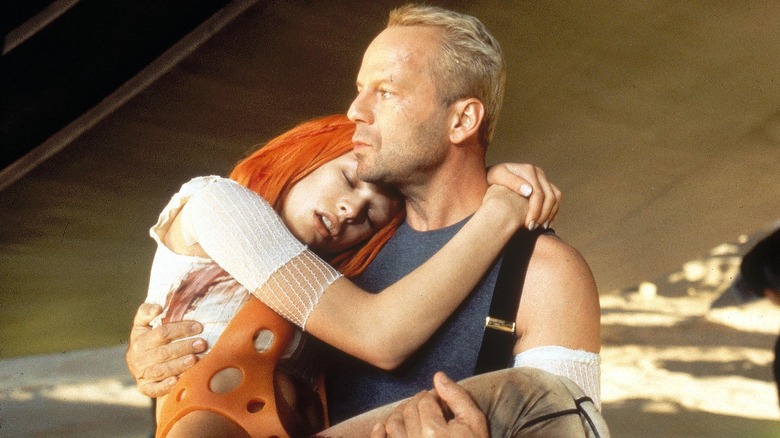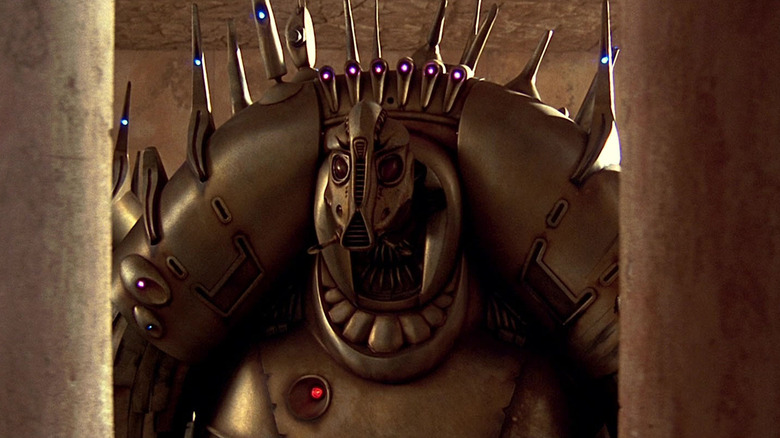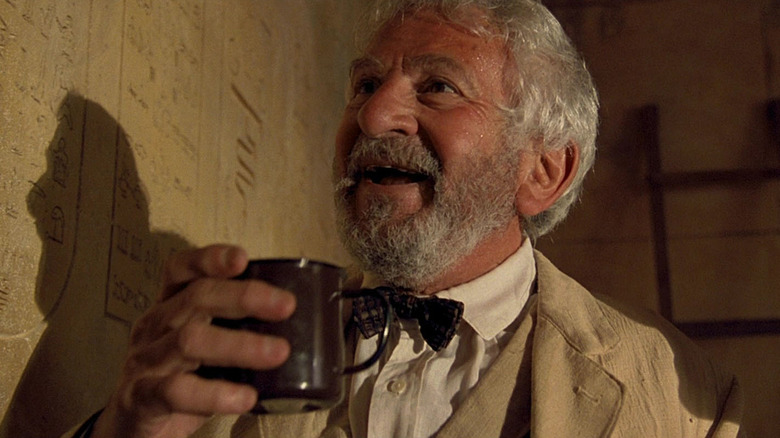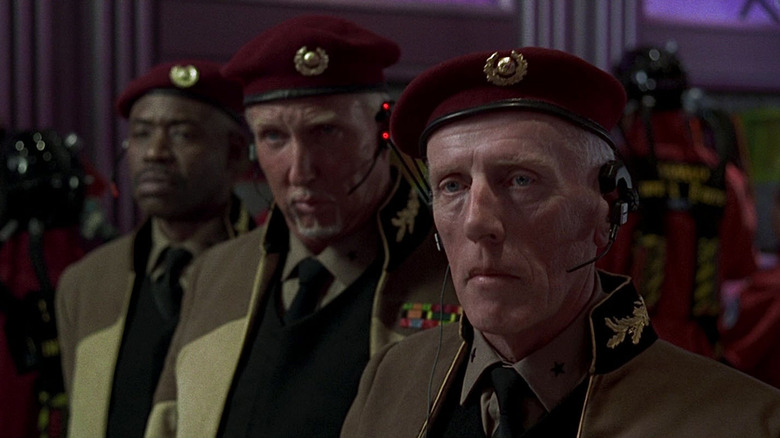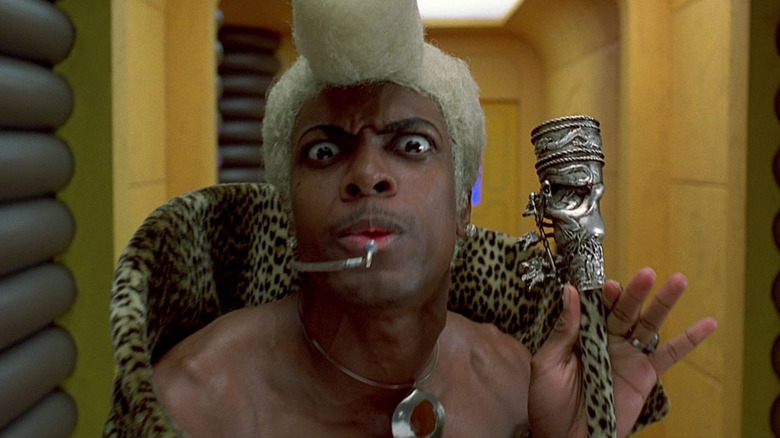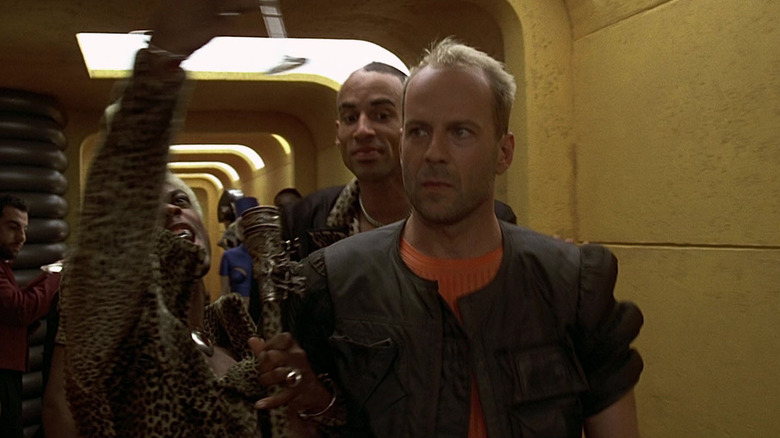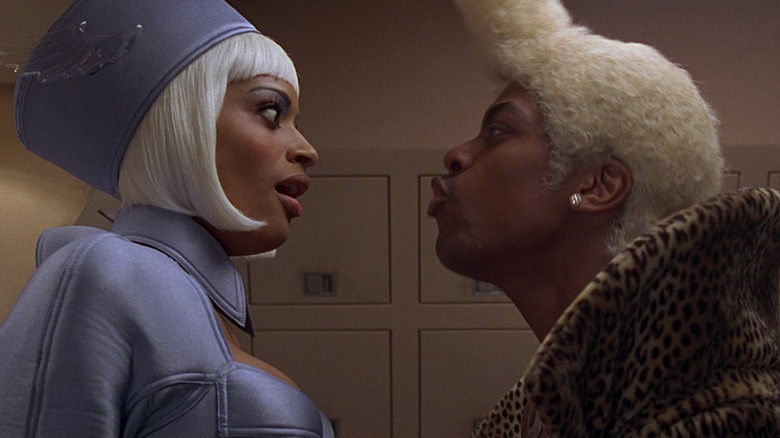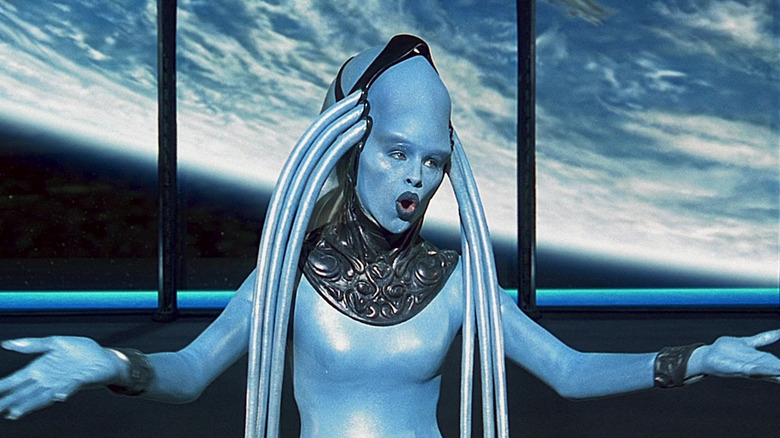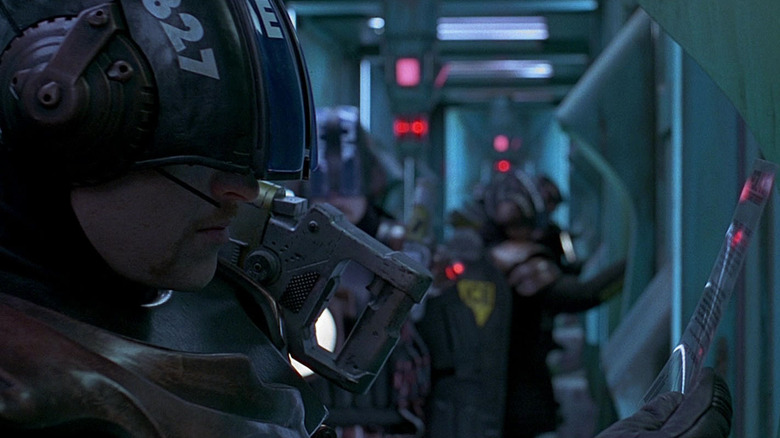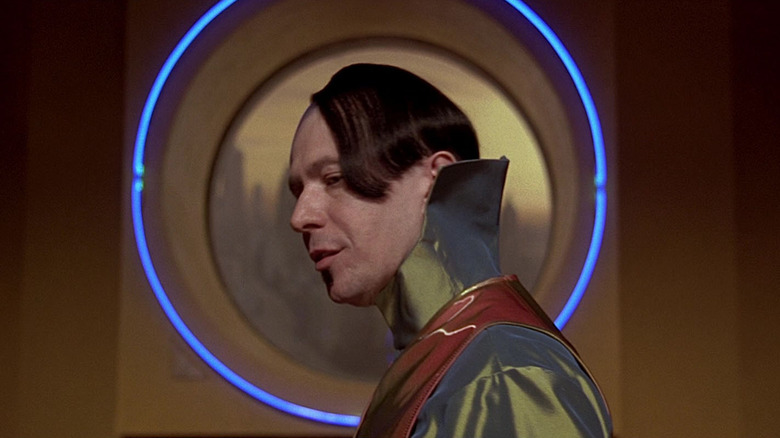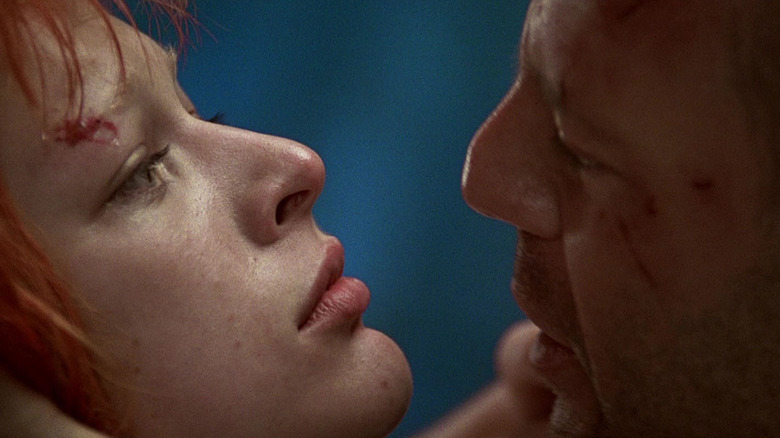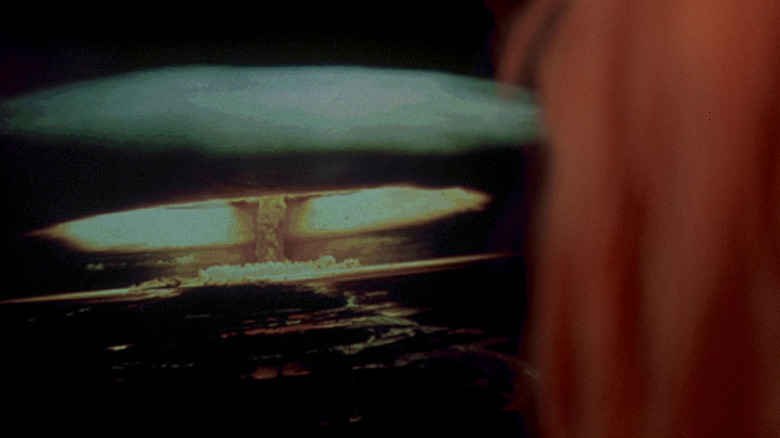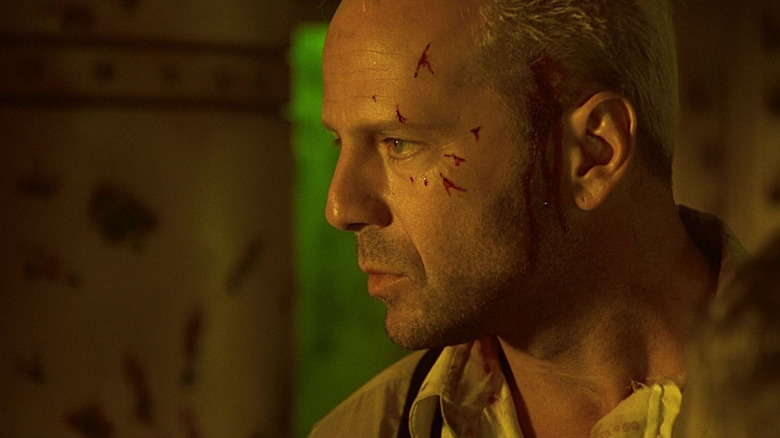Things You Only Notice About The Fifth Element As An Adult
Sometimes, rewatching a favorite movie from childhood can ruin the film for you, and other times it only enhances the experience. Nearly every movie that's deemed "kid-friendly" has more than a few adult components hidden throughout to entertain parents watching. Whether it's animated Disney films that have a surprising level of darkness or movies like "The Fifth Element" that are made for adult and teen audiences alike, it's fun to rewatch and discover these moments later in life.
Despite its PG-13 rating, "The Fifth Element" has multiple adult themes and references that went over kids' heads back in 1997 when the movie debuted — and kids today are probably still stumped by a few scenes. The adult nature of the film is more blatant in some scenes than others, as several have a subtler touch. Additionally, the film boasts numerous pop culture references — including allusions to Prince — that were likely lost on kids at the time. Additionally, certain political and historical references that litter the movie might be a bit too nuanced for most kids to notice.
Between not-so-obvious sex scenes, some consent discrepancies, and insidious political implications, did you catch these details when you were a kid watching "The Fifth Element"?
A sci-fi satire
Some of the best satire is done subtly enough for the audience to question whether or not they should take a movie at face value. The satirical elements in "The Fifth Element" are lowkey enough to stump its younger viewers, though most adults with an awareness of the sci-fi genre catch on pretty quickly to the movie's cheekier moments. From the absurd design of the Mondoshawan at the beginning of the film to the sci-fi homages sprinkled throughout, it's apparent that "The Fifth Element" doesn't take itself seriously — allowing audiences to have fun with their viewing experience.
The movie pulls from various sci-fi classics like "Star Wars," with a Princess Leia updo resting on the head of a military leader and the futuristic priest giving off serious Obi-Wan Kenobi vibes. Yet unlike true parodies like "Spaceballs," the absurdity of "The Fifth Element" isn't so far-fetched that it becomes a comedy completely roasting the genre. Even a child can tell that "Spaceballs" is a playful comedy that isn't meant to be taken all that seriously. However, the movie's "Austin Powers"-adjacent treatment of villains like Jean-Baptiste Emanuel Zorg (Gary Oldman) is over-the-top enough to toe that line.
An attempted poisoning
Not all nuances are entirely obvious to children who haven't become jaded by the world yet. At the beginning of the film, the priest tasked with protecting the Fifth Element hands the professor a cup of water to toast his findings. Innocent enough, right? Nope. The priest is very obviously trying to poison the professor. And while the priest isn't necessarily evil, he's willing to sacrifice one man to protect the sacred secret he's been tasked with keeping.
Sure, the "needs of the many outweigh the needs of the one" mentality is a lackluster argument, but what would we do if we faced a real-life trolley problem? If you were in a position to sacrifice one person to save many, could you do it? Tweaks can be made to the trolley problem to add in other layers — like whether or not you know any of the people, if they're older and/or sickly, etc. Regardless, it's clear what the priest's answer to that problem is.
Yet despite the priest's best efforts to poison him, the professor isn't about to toast an accomplishment with water. He gets some booze with a devilish label that looks eerily like the priest and makes a proper toast. However, it's still not enough to save him, as he gets killed by a Mondoshawan for interference. He may be good at translating symbols, but his social awareness needs a bit of work.
Peeping Tom energy
"The Fifth Element" really pushes its PG-13 rating at times, going as far as showing nudity onscreen at one point. Yet most of the sexualized content in the film is subtle enough to go over the heads of a young audience. One such moment comes when Munro (Brion James) says, "I'd, uh, like to get a few pictures for the archives before she wakes up." Of course, he's referring to a very naked Leeloo (Milla Jovovich), and his comment has nothing to do with record-keeping.
Munro perks up at the sight of the feminine supreme being who's just been essentially reborn. He doesn't stop himself from ogling the scared and naive woman, and no one responds negatively to his creepy comment. It's obvious to any adult watching the movie that he has no intention of cataloging any pictures of the woman. He wants them for his own personal collection, and he's not fooling anyone on or off the screen (except for kids in the audience, that is). Really, someone should say something at this moment, because although "The Fifth Element" was relatively ahead of its time on matters of sex, this scene leaves a bad taste in fans' mouths.
An homage to Prince
Sadly, kids growing up in the mid-to-late '90s didn't have Prince as the focal point of their pop culture experience. They had Britney Spears, boy bands like the Backstreet Boys, and pop punk rockers making a splash in the pop culture landscape. And though most of those kids would eventually grow up to discover the joys of Prince, he was more of a staple for youth in the '80s than the late '90s.
As a result, most young fans probably didn't realize that radio broadcaster extraordinaire Ruby Rhod (Chris Tucker) was actually an exaggerated parody of Prince. In fact, "The Fifth Element" director Luc Besson originally wrote the role for Prince, according to Besson. Following the icon's 2016 death, Besson posted a photo of Prince by Jean Paul Gaultier on Twitter with the caption, "Prince by @JPGaultier. He was supposed to play Ruby in the 5th Element...but couldn't find dates during his tour..." He ended the sentiment with a single tear emoji.
However, despite the fact that Prince never appeared in the film, his energy is palpable. Without even knowing that behind-the-scenes fact, it's clear that Prince inspired the character — from the delightfully outlandish clothing to the outgoing personality. Of course, the film went overboard with those particular characteristics, but that's what satire is all about.
All Night Long
Most kids in 1997 wouldn't be well-versed in the smooth tones of Lionel Richie, but adults appreciated Ruby's homage to the Motown legend. In fact, Korben can't keep a straight face in the scene due to Bruce Willis trying to stop himself from breaking character during the outlandishly boppy number. Willis had trouble keeping composure in several moments of the film (who can blame him?), so his character just appears as a fun-loving guy who's always ready to smile, which mostly works for his character. These kinds of breaks in satirical movies only enhance the audience's fun, however, so it's not a big deal.
But on top of kids likely not realizing who Lionel Richie is, they also wouldn't notice that most of the Swahili used in the song isn't Swahili at all — but made-up nonsense words that have no real meaning (via The Washington Post). The number is perfectly placed, however, as Korben is flying to what should be a vacation. The audience knows the trip is a cover for world-saving mission, but poor eccentric Ruby doesn't know that. As a result, "All Night Long" has all of the vacation vibes, making it the perfect song to parody Prince in this epic movie moment.
Getting down and dirty
It's all fun and games until you realize you just showed your kid a movie that almost has graphic oral sex in it. "The Fifth Element" is pretty clever about how it structures its sex scenes (which is surprising given its brief but excessive nudity scene). And though kids may not realize that there's a whole lot more going on between Ruby and a flight attendant beyond some innocent nuzzling, that doesn't change the fact that the film pulls off an intense scene for a PG-13 movie.
The film expertly uses scene transitions to hide the actual act, but after the breakages in scenes, Ruby emerges from the floor to a symphony of noises from the stewardess that aren't exactly safe for work. Before preparing for takeoff, Ruby tells her, "I don't want an individual position, I want all positions!" And, well, he certainly lives up to that expectation.
It's a pretty bold sequence from a '90s movie, given how many films at the time didn't include sex at all if it wasn't all about male pleasure. Usually, the men get the focus in these kinds of scenes, and it's cool to see two strangers hook up and have the focus be on the woman instead of yet another scene where a woman gives a man oral sex. Ten points to "The Fifth Element."
The real diva
Unless they're big opera fans, people watching "The Fifth Element" when it debuted likely didn't realize that Inva Mula voiced the blue alien performer Diva Plavalaguna during the film's iconic number, "The Diva Dance." The operatic soprano nailed the high notes of the piece, but if it sounds too otherworldly to be real, that's because it is. The filmmakers wanted the notes to rise and fall in a way that's not humanly possible — which makes sense for an alien performance.
Instead of compromising their vision to align with what mere mortals can produce, Mula rose to the challenge and recorded the notes separately for editors to then splice together to get that ethereal element into the performance. Honestly, most adults wouldn't come to this realization unless they're big music aficionados, so it's highly unlikely that any kids noticed anything in this performance beyond, "Wow, that blue lady sounds really cool." And hey, they're not wrong. That blue lady does sound really cool.
Dictator vibes
Sometimes, movies are intentionally vague about the universe's setup, and that's certainly the case for "The Fifth Element." Fans get glimpses of the universe that Korben lives in, but most aspects of the world's politics and civilization go wholly unexplained. Though the film doesn't break down the fictional society beyond flashes here and there, one thing stands out: The citizens seem to live in a heavy police state.
President Linberg (Tom Lister Jr.) appears to be a benevolent president, but as the leader of the Federated Army and Federated Territories, just how much power does he have? Sure, the movie takes place during a period of unrest where a great evil threatens the universe. But the largely unexplained political system implies strong dictatorial elements. Exactly how many territories does President Linberg rule over? Was he voted into his position? What rights do civilians have, and how aggressively does the Federated Army rule over the universe?
These are all questions that don't have very clear answers in the movie, but given how many police raids we see and the fact that every location has yellow markers for people to put their hands up, the world definitely appears to be a police state. And though the "president" seems to be against evil, we never quite learn what his deal is and if he is, in fact, a benevolent ruler — or a power-hungry dictator who duped all of society.
Gary Oldman's real accent
Despite Gary Oldman's Southern drawl in "The Fifth Element," the actor is actually British. Of course, the movie was released long before Oldman became Harry's godfather Sirius Black in the "Harry Potter" franchise. As a result, most kids in the '90s likely didn't realize that Oldman doesn't actually have an American accent — let alone a Southern one.
Adult fans at the time would probably have recognized Oldman from roles in films like "Sid and Nancy," "JFK," and "Dracula," where he played the self-titled bloodthirsty vampire himself. He's been around the block more than a few times.
Oldman has since cited his dislike of "The Fifth Element," telling Playboy, "Oh no. I can't bear it." To be fair, he noted that he's a perfectionist and criticized some of his most popular films, adding, "Most of my work I would just stomp into the ground and start over again." That's certainly something many people can relate to. How many times do we wish we could have done something differently or reacted in a different way? That being said, fans are certainly glad that Oldman has been a part of so many incredible films.
Consent? What consent?
"The Fifth Element" almost realizes how creepy the budding relationship between Korben and Leeloo is. After Korben saves her from the police, he kisses her when she's passed out. Korben self-corrects and realizes that he's completely out of bounds — but not until Leeloo wakes up and fends him off. He asks the priest for a translation, saying that Leeloo said, "Never without my permission." Duh.
Korben sussed out the meaning on his own already, but it's not just creepy when he doesn't ask permission. Sure, Leeloo is technically a very old supreme being, but she's essentially a toddler by human standards. Leeloo has a new body that she doesn't understand how to use, and she has no concept of human behavior, culture, or even how to communicate with Korben in any meaningful way.
Granted, she does have a grasp on the "this is my body, not yours" concept, but it's still not enough to warrant a relationship with Korben by the end of the movie — which appears to take place less than a week after the movie's initial flashback sequence.
Given that she's still learning about the human condition by the film's close, the kiss at the end isn't gratifying. Not only is Korben coaxing a confused Leeloo to possibly sacrifice her life in this moment, but she's, once again, barely conscious when they fend off the attacking Evil. Can he just give her a minute to adjust before pouncing? Their "happy" ending leaves a bad taste in many fans' mouths.
An endless litany of war
When Leeloo searches for war in the database to attempt to understand what it means, her screen flashes through a significant number of war photographs — primarily consisting of World War II tragedies. Most older kids would recognize some components of the images, especially those of Nazis and Hitler. Yet they may not realize that these are actual photos from the war.
One of the first images in the sequence is a photo from Yevgeny Khaldei, titled "Raising a Flag over the Reichstag." The title is fairly self-explanatory for the image, which depicts the Red Flag over Reichstag — which is the German seat of government in Berlin. Photographer W. Eugene Smith's photo of U.S. Avenger fighter bombers circling Saipan Island makes an appearance as well, and it has nothing to do with Captain America.
There's also Josef Koudelka's photo depicting a Czech citizen on a tank, which the photographer took during the 1968 Prague Invasion. Other images include the USS Ticonderoga which, no, isn't a Number 2 pencil, kids — it was a WWII aircraft carrier. Also included is a photo of Hitler leading the Nazis and the atomic bombings of Hiroshima and Nagasaki.
So much real-world tragedy is difficult for fans who are watching the movie and already know about these dark periods of history. Now imagine someone learning about war for the first time and getting a hefty dose of these impactful photos all at once. It's a lot. Kids have that same realization of just what this scene is when they're old enough to understand its place in history.
A narcissistic mother
Kids might think that Korben's overbearing mother is funny, but she's actually one of the most insidious characters in the movie. Most of the film's villains are surface-level and minimally fleshed out, but we hear from Korben's mom several times throughout "The Fifth Element," and it's never a good thing.
While her son is trying to save the world, Korben's mom repeatedly calls to guilt trip him for not inviting her on the "vacation" after his winning is announced on the radio (thanks, Ruby). He tries to explain that he's not exactly on vacation, but she just irately cuts him off and continues to barrel over everything he says, going as far as unwishing his birth. Over vacation tickets? Really? The guy just lost his job and is still reeling from a difficult divorce. Can you chill?
While kids may not notice how toxic this behavior is, she's not exactly telling him something as frivolous as not to eat dessert before dinner. She's expressing regret over giving birth to him because she's mad he didn't invite her on vacation. This is textbook narcissistic behavior, and it's clear that Korben had a rough childhood. It really lends insight into his despair over his failed marriage and his deep affection for his cat, the only affection he seems to have in his life. The guy does have a lot of love to give, and he does deserve getting it back (maybe just not with someone who's still learning human behavior).
